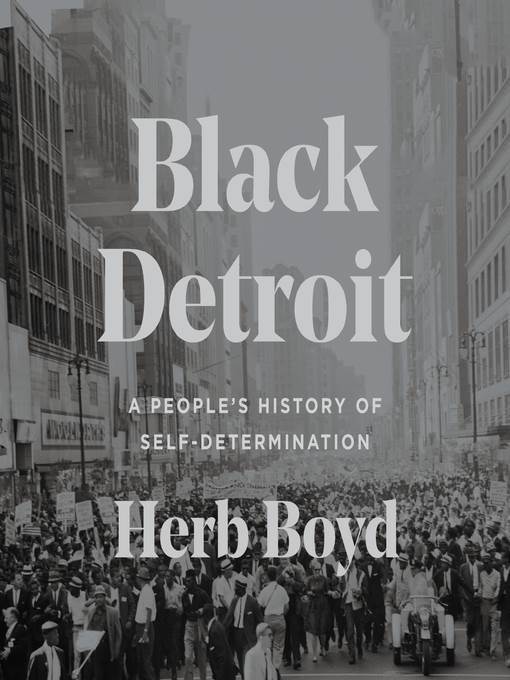
Black Detroit
A People's History of Self-Determination
کتاب های مرتبط
- اطلاعات
- نقد و بررسی
- دیدگاه کاربران
نقد و بررسی

Boyd packs hundreds of years of rich and poignant African-American culture into his history of Detroit. His account gets the proper treatment in the deep voice and deliberate pacing of narrator James Shippy. He commands the prose with such skill that the intention of every sentence is clear through his emphasis and timing. However, Boyd's prose and rich detail can carry on for so long that even Shippy may have trouble keeping the attention of some listeners. The various threads of history that comprise the African-American experience in Detroit get a full account--perhaps too full--through Boyd's in-depth work. At its best, it establishes a rich cultural tapestry within a city that has become both a central hub and a place of alienation for African-Americans. L.E. � AudioFile 2018, Portland, Maine

Starred review from May 15, 2017
Boyd (Baldwin’s Harlem) breathes new life into the history of Detroit through stories of the city’s black residents from its earliest days to its bittersweet present. True to its title, the book documents the display of black determination, a mix of ingenuity, courage, and persistence in the midst of discrimination and repression. Boyd aptly highlights the complexity of the city’s racial legacy from its earliest days. Detroit was neither a slaveholding territory nor fully free; he tells of Thornton and Lucie Blackburn, who in 1831 escaped slavery in Kentucky for the promise of freedom in Detroit, only to be arrested in their new home two years later under the Fugitive Slave Act. A group of outraged black citizens rallied together to plan a jailbreak and secure the couple’s passage to Canada. By the 1920s, the city’s formerly small black population had ballooned into a bustling community, mainly due to Henry Ford’s $5 hourly wage, which attracted Southerners during the Great Migration. Boyd also examines the city’s black newspapers, Berry Gordy’s founding of Motown, and the fall from grace of the city’s youngest mayor, Kwame Kilpatrick. He leaves no stone unturned, making his work an invaluable repository of all that is black Detroit. 16-page b&w photo insert.

January 1, 2017
Writer and historian Boyd blends memoir, history, and reportage in this consideration of the Motor City and its significance for black Americans.
Copyright 2017 Library Journal, LLC Used with permission.

June 1, 2017
In his latest work, Boyd (The Diary of Malcolm X) covers more than 300 years' worth of Detroit history, from the arrival of the earliest African slaves in the early 1700s to the struggle to rebuild the city in the 2010s. The author traces the development of the city through the lens of its black citizens. In doing so, he covers the area's place on the Underground Railroad, the influx of blacks during the Great Migration in the early 20th century, and how civil rights-era demands for fair housing led to the exodus of white residents to the suburbs. Boyd also covers arts and culture, touching on prominent Detroiters such as boxer Joe Louis, religious leader Elijah Muhammad, and singer Aretha Franklin, and looking at the lasting influence of Barry Gordy and Motown. With a lot of history to cover in a relatively short amount of space, this book can feel rushed at times. However, the extensive coverage demonstrates the full range and influence of black citizens in Detroit. VERDICT Recommended for anyone interested in Detroit or in urban history.--Nicholas Graham, Univ. of North Carolina, Chapel Hill
Copyright 2017 Library Journal, LLC Used with permission.

May 15, 2017
The history of the many contributions of African-American Detroit to the larger American project.If Paris, as the German critic Walter Benjamin put it, was the capital of the 19th century, then Detroit was surely the capital of 20th-century African-America. As native son Boyd (African-American History and Culture/City Coll. of New York; Black Panthers for Beginners, 2015, etc.), a respected author and journalist, recounts, this centrality dates back to the American Revolution but became pronounced at the time of the Civil War, when Detroit went from being an important station along the Underground Railroad to become an important source of abolitionism, industrialism, and sheer manpower for the war effort--including black soldiers bound for the Union ranks. As the author notes, however, the ascendancy of Black Detroit did not mean an end to racial tension; though he grew up on a block with Italian, Irish, and Jewish families, "our blackness was for our neighbors an object of derision and insult." Boyd celebrates the rising-above that accompanied this ethnic contest, the grit and determination that put Berry Gordy's Motown on the map, lifted the members of the Supremes and the Miracles from the projects, and ushered in a second black literary renaissance through the pens of Gwendolyn Brooks and Nikki Giovanni. As he reminds his readers, immigrants and exiles from other regions and countries did their parts to shape Black Detroit: Malcolm X lived there before moving to New York and taking a leading part in the radical wing of the civil rights movement, while Rosa Parks moved there from the South in 1957. "Parks's commitment to fight Jim Crow--North or South--was unrelenting," writes the author. Though the city has fallen victim since to outmigration, its population having fallen from 1.8 million in 1950 to about 670,000 today, Boyd writes confidently that the city's African-American population will be central to its revival, concluding, "I'm proud to be a Detroiter." An inspiring, illuminating book that will interest students of urban history and the black experience.
COPYRIGHT(2017) Kirkus Reviews, ALL RIGHTS RESERVED.

























دیدگاه کاربران